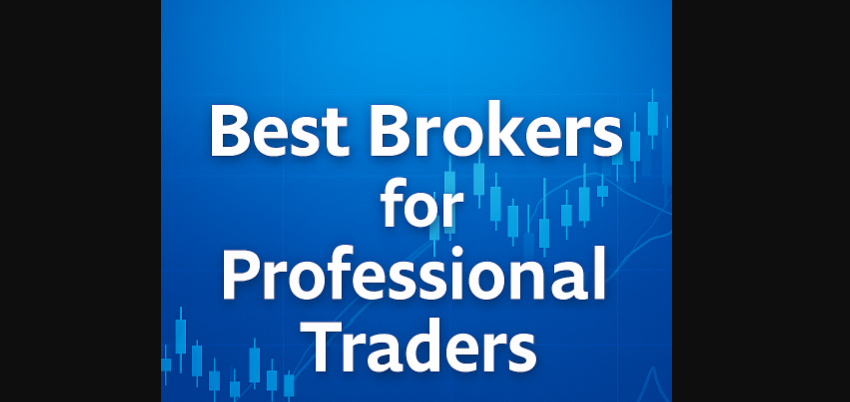The best brokers for professional traders emphasize accuracy, performance, institutional-grade stability, and speed. High-volume strategists need tight spreads, advanced platforms, and near-perfect execution, while experienced traders depend on deep liquidity.
A good broker not only offers access to markets but also provides the tools, technology, and stability needed for consistent profits. The best brokers are the ones you can depend on every day for the reliability and trading conditions you need. This guide aims to identify such brokers.
Key Points Table
| Broker | Key Point (User Experience Highlight) |
|---|---|
| FP Markets | Fast execution and customizable platforms ideal for active traders. |
| Fusion Markets | Ultra-low-cost trading with a simple, beginner-friendly interface. |
| Eightcap | Clean platform with strong crypto and CFD trading tools. |
| BlackBull Markets | High-speed execution with advanced charting and ECN-style trading. |
| Global Prime | Transparent trading environment with excellent customer support. |
| Pepperstone | Smooth, professional-grade platforms like MT4, MT5, and cTrader. |
| Axi | User-focused interface with strong educational tools and easy navigation. |
| Plus500 | Very simple, minimalistic interface perfect for quick CFD trading. |
| AvaTrade | Intuitive platforms with automated trading and strong mobile apps. |
| IG | Highly refined, feature-rich platform suitable for all experience levels. |
1. FP Markets
FP Markets (First Prudential Markets) came into existence in 2005. The company is reputed for providing high maximum leverage which is 1:500 for major currency pairs. The broker gives several account types i.e. Standard (spreads from ~1.0 pips) and Raw (spreads from 0.0 pips) for ECN.
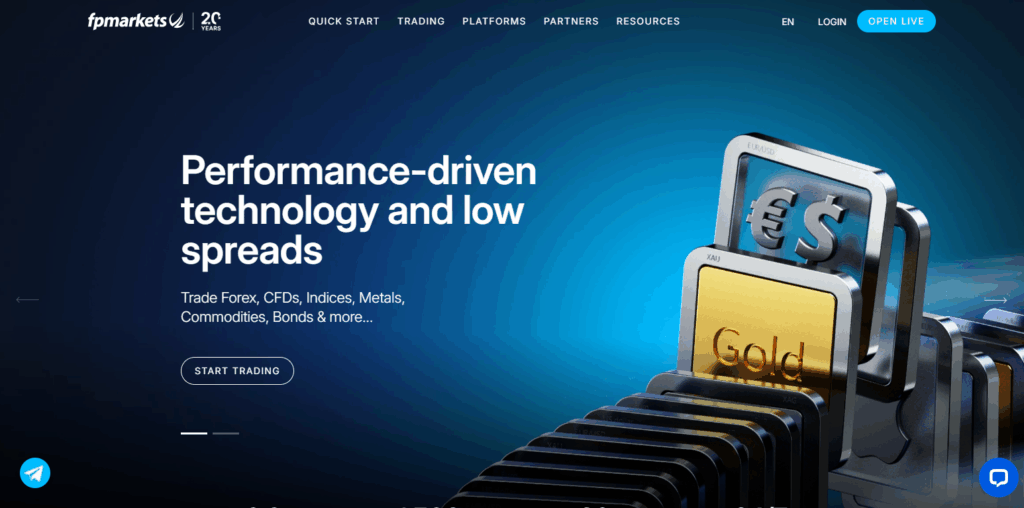
FP Markets is best suited for professional traders owing to it’s deep liquidity, low-cost ECN execution and flexibility to use expert advisers (EAs). The company’s regulation under ASIC and CySEC is a positive sign to high-profile users for added credibility.
FP Markets Pros & Cons
Pros
- The ability to focus on one or two pairs means that traders can have even lower costs than are mentioned here.
- Wide selection of trading platforms, including MT4 and MT5, cTrader, TradingView, and Iress.
- 10,000 instruments that can be traded on Iress.
- More than one major instrument to trade (ASIC and CySEC)
- Brokers that work with active traders have faster systems.
Cons
- Most mobile apps have fewer tools than their desktop counterparts.
- Comparing brokers tells us that education at FP Markets is less than at most top brokers.
- Iress’s fees mean that small traders can’t use that platform.
- The broker has some country restrictions.
- FP Markets can change merchants and you can receive a margin call.
2. Fusion Markets
Fusion Markets was established in 2017 and is for serious traders within a budget. Maximum leverage is 500:1, however for retail clients under ASIC regulation it’s 30:1. Fusion Markets | Low Cost Forex Broker.
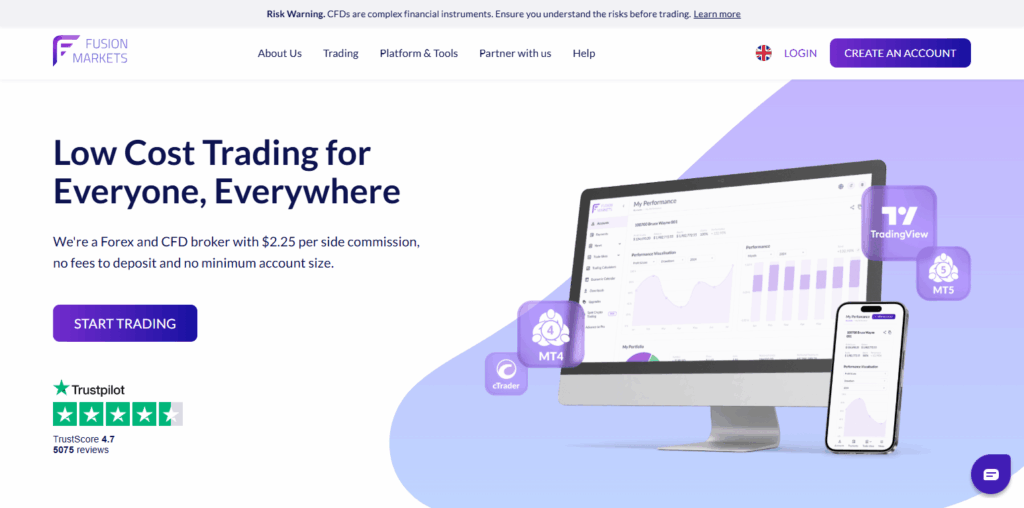
Their Zero Account is ECN styled execution, offering 0.0 pips minimum spreads and a commission (for example, $2.25 per side).
Professional traders enjoy a great margin in it’s low-cost pricing, numerous Forex & CFD instruments, and available trading platforms including MT4, cTrader, and TradingView. Thus, Fusion Markets has been For Professional Traders one of the Best Brokers.
Fusion Markets Pros & Cons
Pros:
- Very low cost of trading and the spread is very competitive.
- Major players are MT4, MT5, and web-based terminals.
- A very low minimum deposit is needed which makes this very accessible to the new traders.
- Provides opportunity for copy trading and passive investing.
- Fast account opening and adequate customer service.
Cons:
- Range of products on offer is limited and has few real stocks, options, or futures.
- The educational resources and the proprietary analytics offered are on the weaker side.
- Regulated entities in less developed jurisdictions.
- Possible plugin risk: malfunctioning of third-party applications resulting in loss.
- Leverage risk: inefficient risk control while using high leverage to trade can result in significant losses.
3. Eightcap
In Melbourne, Australia, Eightcap started operating in 2009. It has regulations from ASIC, CySEC, UK FCA, and SCB. Eightcap has a wide range of instruments (over 800 markets) and offers MetaTrader and TradingView.
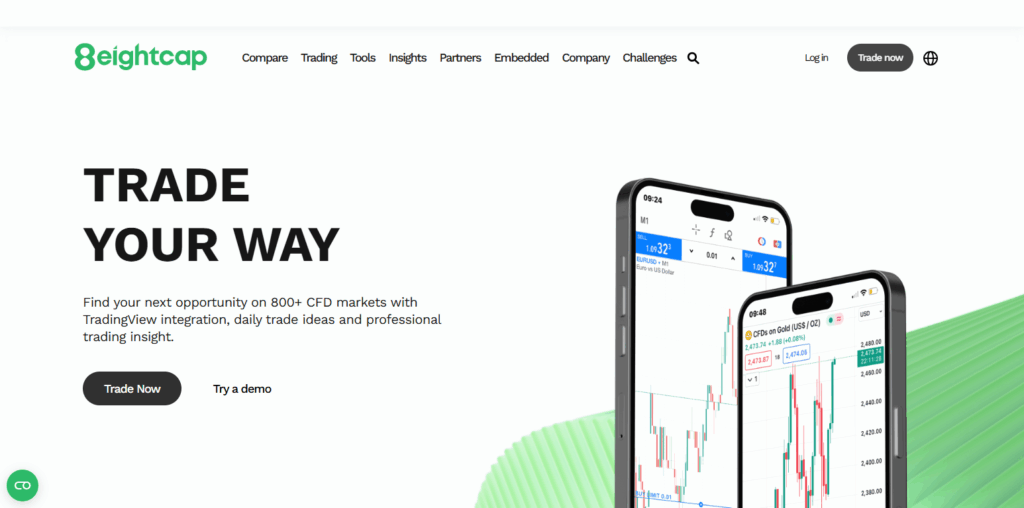
Although maximum leverage varies by account and region, professional traders find it attractive because of low variable spreads and high-tier platform options.Its worldwide regulation and extensive market access make it a great option for committed high-volume trading.
Eightcap Pros & Cons
Pros
- Eightcap is regulated by ASIC, FCA, CySEC, and SCB
- There are over 800 instruments, which includes Crypto
- Integrates MT4, MT5 and TradingView
- There are strong Crypto CFD(s)
Cons
- There are very few available research tools
- It does not operate in the United States
- People have reported that customer support is slow to respond
4. BlackBull Markets
BlackBull Markets started in 2014 in Auckland, New Zealand. Black Bull It offers leverage up to 1:500. The account specifications state that the Prime/Institutional accounts offer spreads up to 0.0 pips.
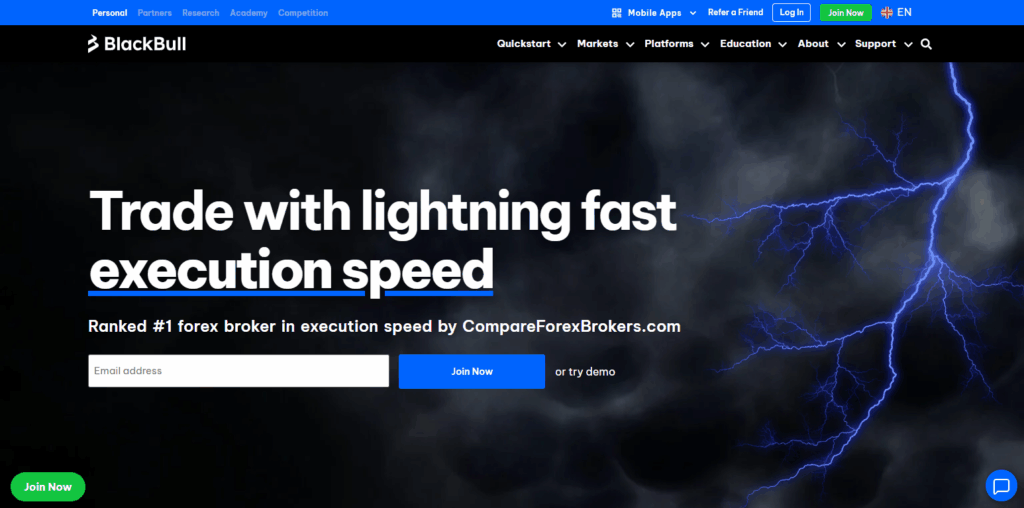
BlackBull Markets is considered one of the best brokers for pro traders, as it offers a standard ECN account with no minimum deposit and high-level trading solutions (MT4, MT5, cTrader, TradingView) with deep liquidity, low-latency execution, and very tight spreads.
BlackBull Markets Pros & Cons
Pros
- New Zealand regulation (FMA, FSPR)
- Supported Platforms: MT4, MT5, cTrader, TradingView
- Solid ECN execution model
- Extensive asset coverage
Cons
- Lack of educational & research resources
- Some accounts incur high fees
- Global presence not as strong as IG/Pepperstone
5. Global Prime
Data * Global Prime’s founding year is not publicly available. Most broker comparison websites mention it with a founding year, but it is inconsistent.
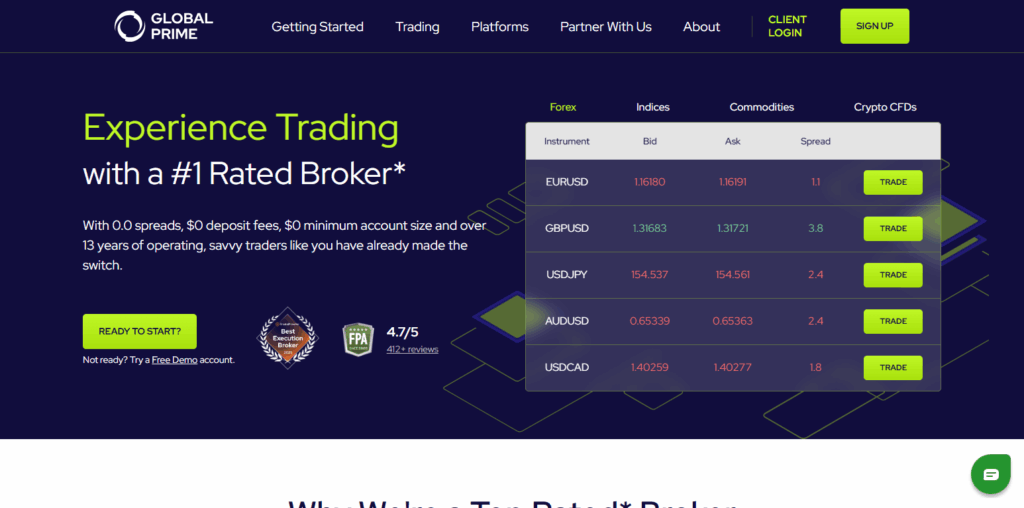
Leverage, Spreads Some comparative sources suggest Global Prime is known for having a transparent trading environment and having competitive costs for high-volume traders.
Global Prime is considered one of the Best Brokers for Professional Traders because of the profitability of trading with them as a professional with demanding high execution and quality tight spread and slippage.
Global Prime Pros & Cons
Pros
- Regulated: ASIC & VFSC
- Trade receipts provided for transparency
- Low minimum deposit ($10)
- Highly rated for customer support
Cons
- Limited offering (predominantly forex/CFDs)
- Notable scale difference with industry leaders
- No proprietary trading platform
6. Pepperstone
Pepperstone was established in 2010 and, as a professional broker, provides trading platforms such as MT4, [MT5], [c] Trader. The Professional Classification is subject to leverage of up to 1:500, where for retail clients it is subject to lower limits, for example, 1:30, depending on the regulation.
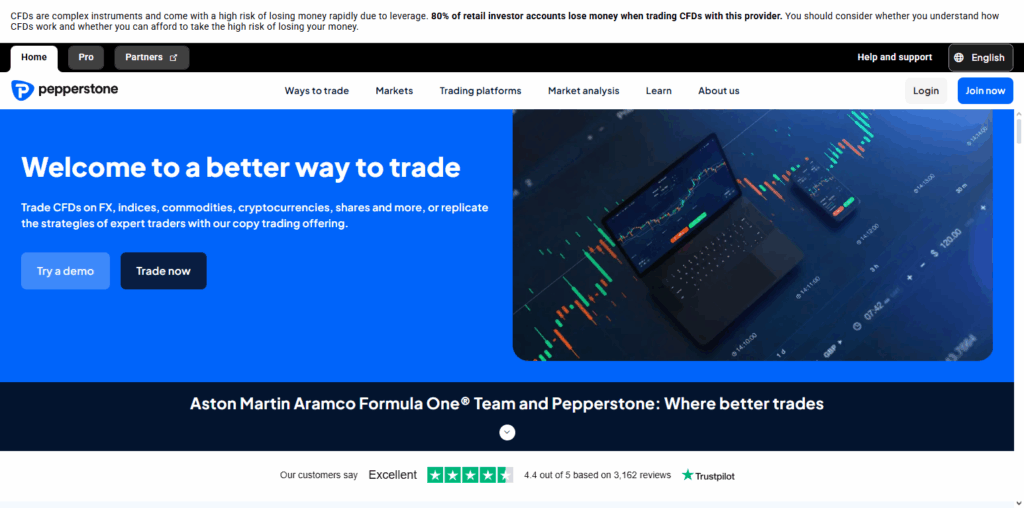
excution on the order is low and the depth of liquid is high in the market. Indeed, it fits low for professional traders where execution in the order is low and the depth of liquidity of the market is high in it.
The spread at Razor accounts starts at 0.0 pips but a commission is charged. Pepperstone’s liquidity, as well as the account’s execution speed, is what makes it famous and highly considered in the top professional trading brokers.
Pepperstone Pros & Cons
Pros
- ASIC, FCA, DFSA, BaFin regulation
- Competitive pricing for forex & CFD trading
- Platform options: MT4, MT5, cTrader, TradingView
- Research & copy trading features are strong
Cons
- Few non-CFD assets
- US, Canada, Belgium, Limited
- Basic Front End Design on MetaTrader
7. Axi
According to Axi’s website, they were founded in 2007 and have the control of ASIC, CySEC, DFSA, FCA, FMA, and others. (FxScouts) Axi has a great trading environment that has great market execution and offers advanced trading tools, but they do have spreads costing a bit more on the “Pro” style accounts.

Axi Vendor Website users claim to have great support and they have good execution. These features make Axi one of the Best Brokers for Professional Traders who value reliability and low cost.
Axi Pros & Cons
Pros
- FCA, ASIC, FMA, DFSA regulation
- No minimum deposit required
- Good support for algo & scalp trading
- Platforms: MT4, AutoChartist, Copy Trading
Cons
- Less extensive product offering vs IG/Plus500
- Educational material could be better
- Less recognition in the industry
8. Plus500
Another reputable broker goes by the name Plus500. (founding year is 2008, but this might vary in different publications) They have user-friendly trading platforms, however they don’t all have the same maximum spreads, leverage, and regulations of one particular country.

Professional traders get higher leverage, but not all newbies to trading CFDs and Forex get the same leverage. Old trading platforms and user-friendly, and with so many countries and regulations, they are certainly one of the Best Brokers for Professional Traders.
Plus500 Pros & Cons
Pros
- Global reach and regulation from authorities such as FCA, ASIC, CySEC, MAS, and FSCA
- User-friendly proprietary platform
- Access to more than 2,800 instruments
- Virtual funds of $40,000 on a free demo account
Cons
- Only trades CFDs; no MT4 or MT5
- Limited educational resources and research tools
- There’s a lot of risk from leverage trading
- Lacks some more sophisticated trading options
9. AvaTrade
According to broker-comparison resources, AvaTrade was established in 2006. More than 1,000 markets are available for trading, including Forex, CFDs, commodities, and crypto.
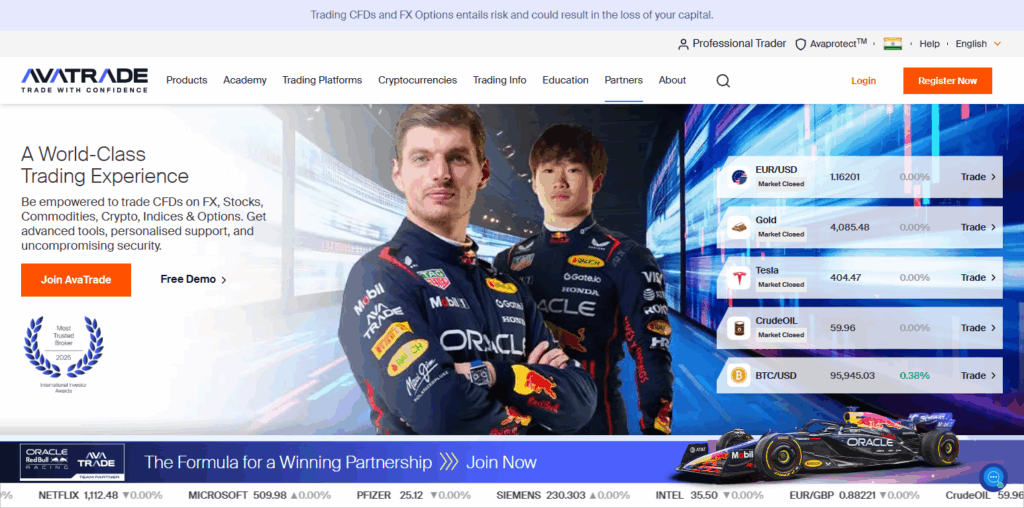
For professional clients, AvaTrade expands to more competitive spreads (e.g., 0 pips in certain instances) for some accounts and large-volume deals.
Automated trading, reliance on regulation, and established history are why AvaTrade is regarded among Best Brokers for Professional Traders in the case of a diversified market.
AvaTrade Pros & Cons
Pros
- Regulated in different countries such as ASIC, CySEC, and FSCA.
- Users can choose different platforms to trade on, such as WebTrader, AvaTradeGO, MT4, MT5, TradingView, or DupliTrade.
- Offers educational services and copy trading.
- No fees for deposits and withdrawals.
Cons
- Only offers trading on forex and CFDs.
- Fee for inactivity on your account.
- Not available for US residents.
10. IG
IG Group was established in 1974 and is based in the UK. This broker is one of the most regulated ones (FCA, etc.). They have access to a huge variety of markets (Forex, CFDs, stocks, and indices.)
For professional traders, IG offers an array of trading instruments, advanced order types, refinanced liquidity, and additional trading features.
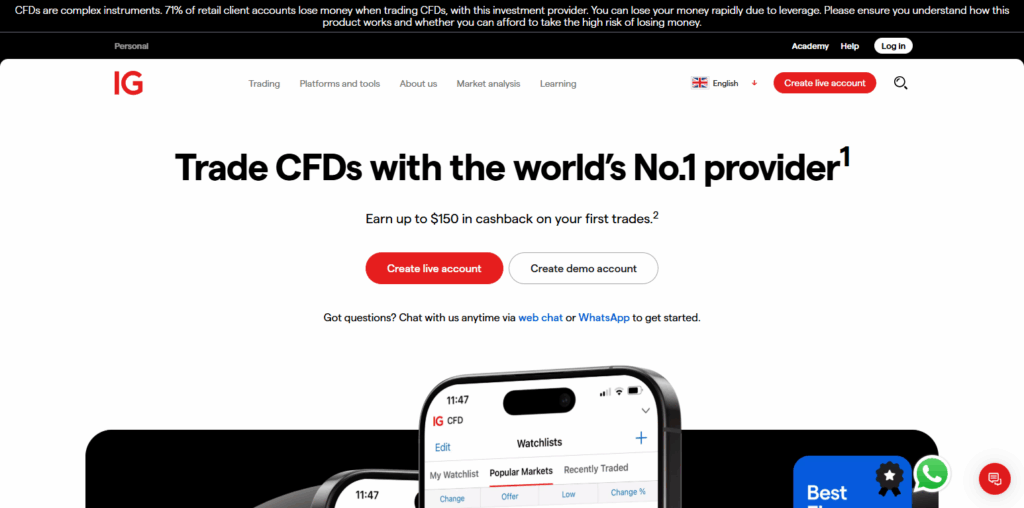
IG has a long and developed spread betting/CFD business, and professional accounts or high-volume trading accounts can have very tight spreads on major Forex pairs (availability of ‘minimum spread’ depends on the account type and trading volume).
IG ranks among the Best Brokers for Professional Traders, owing to its size, market breadth, strong regulation, and positive reputation.
IG Pros & Cons
Pros
- Publicly traded; regulated by FCA and 10+ other jurisdictions
- 20,000+ instruments available (forex, stocks, ETFs, crypto, options)
- Proprietary IG Trading platform, as well as MT4, ProRealTime
- Great research and educational resources
Cons
- High fees; especially for stock CFDs
- Limited product availability in some regions
- Better customer support is needed.
Conclusion
When it comes to finding the Best Brokers for Professional Traders, it necessitates more than just basic usability considering the needs of professionals: deep liquidity, the fastest possible execution, institutional-level platforms, and stable prices even in volatile markets.
Brokers such as FP Markets, Fusion Markets, Pepperstone, Eightcap, BlackBull Markets, Global Prime, Axi, Plus500, AvaTrade, and IG provide premium-level offerings and differentiated execution for more challenging strategies.
If your strategy includes high-volume trading, heavy automation, or the need to switch between platforms, selecting a broker with high-quality execution, tight spreads, and a solid regulatory framework promotes efficiency in your trading in the long run.
A broker is a professional’s trading edge in every market—a facilitator of precision, consistent performance, and high efficiency.
FAQ
What makes a broker suitable for professional traders?
A broker is ideal for professional traders when it offers deep liquidity, ultra-fast execution speeds, institutional-grade platforms (MT4/MT5, cTrader, TradingView, proprietary systems), low spreads, transparent pricing, and strong regulatory oversight. Professionals also expect advanced tools, API access, and excellent stability during volatile market conditions.
Which brokers offer the lowest spreads for high-volume trading?
Brokers such as FP Markets, Pepperstone, Fusion Markets, and Global Prime are known for very tight raw ECN spreads, often starting from 0.0 pips. These brokers are preferred by scalpers, day traders, and algorithmic traders who need consistent low-cost execution.
Do professional traders need higher leverage?
Higher leverage can help professionals maximize capital efficiency, but it also increases risk. Many pro traders use brokers offering leverage up to 1:500 or 1:1000 depending on the jurisdiction. However, traders should apply strict risk management and ensure trading strategies can handle leverage safely.
Are proprietary platforms better than MT4/MT5 or cTrader?
Proprietary platforms like those from IG or Plus500 offer user-friendly interfaces and integrated tools, while MT4, MT5, and cTrader provide more flexibility, custom indicators, and algorithmic trading support. Professional traders typically prefer MT4/MT5 or cTrader due to stability, automation features, and global familiarity.
Which brokers are best for algorithmic and automated trading?
Pepperstone, FP Markets, Fusion Markets, Eightcap, and BlackBull Markets are top choices for algorithmic traders. They offer fast execution, VPS hosting, raw spreads, and support for EAs, APIs, and third-party automation tools.


